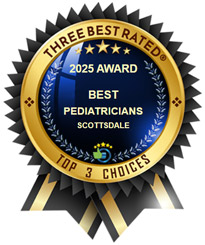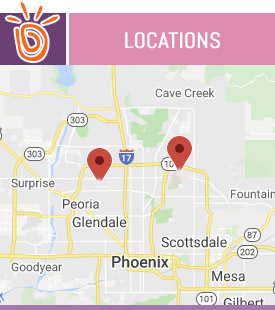Meningitis Vaccination for Children in Scottsdale and Glendale, AZ
Meningitis is a serious medical condition characterized by inflammation of the protective membranes covering the brain and spinal cord. It can be caused by various pathogens such as bacteria, viruses, or fungi, and prompt diagnosis and treatment are essential to prevent complications. Dr. Maria Nabong offers meningitis vaccination at Kidshealth Pediatric. For more information, please contact us or book an appointment online. We Have two Pediatric Clinics in Scottsdale, AZ & Glendale, AZ.




Table of Contents:
What causes meningitis in children?
How do I know if my child has meningitis?
Why are children at risk for meningitis?
At what age do kids get the meningitis vaccine?
Meningitis is caused by infections that lead to the inflammation of the protective membranes covering the brain and spinal cord, known as the meninges. Viral meningitis is the most common type and is usually less severe than bacterial meningitis. Enteroviruses are the most frequent cause of this type of meningitis. In addition, various other viruses, such as herpes simplex virus, mumps virus, and influenza virus, can also lead to viral meningitis.
In contrast to viral meningitis, bacterial meningitis is more severe and can be life-threatening if not treated promptly. Streptococcus pneumoniae, Neisseria meningitidis, and Haemophilus influenzae type b (Hib) are types of bacteria that can cause meningitis in children. Bacterial meningitis can lead to complications, such as hearing loss and brain damage. Due to this, it’s incredibly important to consult a pediatrician if you notice any concerning symptoms.
If your child experiences certain symptoms, it’s important to have them assessed by a pediatrician promptly. Some of the most common symptoms of meningitis in children include:
• Fever – A high fever is one of the most common signs of meningitis. It may appear suddenly and be accompanied by chills and other flu-like symptoms.
• Stiff neck – A hallmark symptom of meningitis is a stiff neck, which can make it difficult or painful for your child to touch their chin to their chest.
• Severe headache – Meningitis can cause intense and persistent headaches. In addition, your child may express sensitivity to light.
• Rash – In some cases, meningitis causes small, red ‘pin-prick’ marks that can develop into larger red and purple spots. If your child has a fever and a rash that does not fade under pressure, urgent medical attention is necessary.
• Loss of appetite – Children with meningitis often show a marked decrease in appetite.
• Nausea or vomiting – Frequent nausea and vomiting are common symptoms that often accompany other signs of meningitis.
• Drowsiness and fatigue – Extreme tiredness, difficulty waking up, or unusual drowsiness are commonly observed in children with meningitis.
Meningitis can be life-threatening, so early detection and medical intervention are vital. If you notice any of these symptoms in your child, it’s crucial to bring them in to be assessed by their pediatrician promptly.
Children, especially infants and young toddlers, have underdeveloped immune systems that are less capable of fighting off infections compared to adults. This makes them more susceptible to the bacteria and viruses that can cause meningitis.
Furthermore, children frequently interact in close-contact environments such as daycare centers, schools, and playgrounds. These settings facilitate the spread of infectious agents that can lead to meningitis. Respiratory droplets from coughing, sneezing, and close physical contact can easily transmit bacteria and viruses among children.
It’s important to teach your child hygiene habits, such as frequent hand washing, as well as consult your pediatrician about immunizations to safeguard them from meningitis.
There are three types of vaccines available to help prevent meningococcal disease in the United States: meningococcal conjugate (MenACWY) vaccines, serogroup B meningococcal (MenB) vaccines, and pentavalent (MenABCWY) vaccines.
The CDC recommends the MenACWY vaccination for children between 2 months and 10 years old if they are at increased risk of meningococcal disease. Similarly, the MenB vaccine can be given to children 10 years of age or older if they have certain risk factors.
Additionally, the CDC recommends that all preteens and teens receive meningococcal immunizations. Specifically, it’s recommended that all 11- and 12-year-olds receive the MenACWY vaccine, with a booster shot at 16 years old. Furthermore, teens can get the MenB vaccine between the ages of 16 and 18 years old.
If your child is getting the MenACWY and MenB vaccines simultaneously, the MenABCWY vaccine may be given instead. To learn more about which type of meningococcal vaccine is right for your child, visit Dr. Maria Nabong, MD, at KidsHealth Pediatrics in Scottsdale and Glendale, AZ. For more information, please contact us or book an appointment online. We Have two Pediatric Clinics in Scottsdale, AZ & Glendale, AZ. We serve patients from Glendale AZ, Peoria AZ, Sun City AZ, Scottsdale AZ, North Scottsdale AZ, Grayhawk AZ, and surrounding areas of Phoenix AZ.

Additional Services You May Need

Additional Services You May Need









